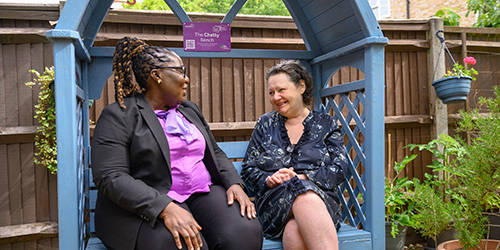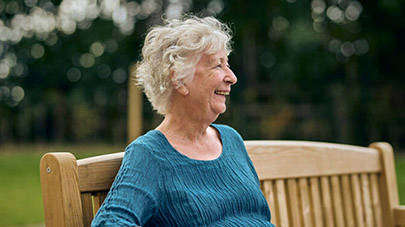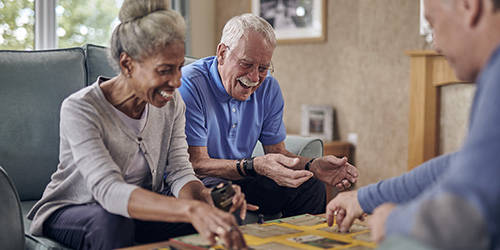- Home
- Guides & support
- Adapting living environments for people with dementia
Last reviewed 31 January 2025
Adapting living environments for people with dementia
It’s important to create engaging environments where people living with dementia can live comfortably and feel supported to maintain independence. By making some small changes, you can help to provide a living environment that supports an individual’s journey with dementia.
 Home decor can be a valuable tool
Home decor can be a valuable tool
People living with dementia can become confused in their environment, so it’s a good idea to make sure everything is easily recognisable. Colour contrasts are often a quick and effective way of helping surroundings and important things to stand out – for example, try painting handrails, doors and furniture in bold colours. The Alzheimer’s & Dementia Resource Center outlines some interesting effects colour can have on people living with dementia. Like red can induce warmth, blue is calming, and lime green is highly visible.
If an individual is struggling with eating it may be worth considering that research has shown that those with dementia may not be able to see their food on the plate if it is white, whereas bright high-contrast coloured plates can help people to eat more.
Consider your lighting
People living with dementia can be prone to falls and confusion, which good lighting can help to reduce. Natural lighting is best, so make sure to open all curtains and prevent anything inside or outside the home that could restrict sunlight from entering through the windows. As older people are more likely to need the bathroom during the night, it is important to ensure light switches are easily reachable or light sensors could be introduced.
Make your floors safer
To prevent falls from happening, evaluate your home from the perspective of the person living with dementia. Make sure floors are kept clear of clutter and try to avoid rugs that could confuse the individual and make them think they have to step over something. A glossy floor may be perceived as wet, and dark spots may be mistaken for holes, so a plain matt surface is the best option.
Visual stimuli can help dementia
Surrounding a person with photos or other images that can trigger some of their favourite memories can have a positive effect. Introducing engaging decorations and colours around the home may also be helpful. Many Anchor care homes have reminiscence rooms (decorated to replicate the different eras and styles for example, with relevant artefacts, such as images, radios and TVs from a time that may feel more familiar) or hold reminiscence sessions, helping residents to relax and feel safe and connected in a way that is tailored to their individual needs. A study found that using personal photos in reminiscence therapy may improve the quality of life for those with dementia by stimulating the brain.
Embrace the great outdoors
Access to outside space is also important as it provides the opportunity for exercise, fresh air, relieves tension and anxiety, and offers personal space for reflection and privacy. Spending time outside can be influential on physical health, emotional health, and social well-being. Research into daily garden use shows that going outside can positively impact the quality of life for people living with dementia. Within this study, caregivers experienced and observed the benefits of going outside for themselves, the residents and relatives.
 Spending time outside also stimulates the production of vitamin D, helping to maintain healthy muscles and bones, and offers stimulation through different colours, textures and natural smells and sounds.
Spending time outside also stimulates the production of vitamin D, helping to maintain healthy muscles and bones, and offers stimulation through different colours, textures and natural smells and sounds.
Supportive environments at Anchor
Our person-centred care homes promote comfort, independence, and engagement. We base the layout and design of our homes on best practice guidance, including appropriate signage that is clearly worded and pictorially illustrated.
We use contrasting colours to help make our buildings more supportive and easier to navigate for those with impaired memory and high levels of anxiety. We focus on creating a homely atmosphere to promote feelings of safety and familiarity, as well as themed areas based on what residents would like to see, that encourage engagement, nostalgia, and reminiscence. We encourage residents to create a ‘home-from-home’ atmosphere in their bedrooms by bringing their personal belongings into the care home.
Most of our care homes have private, secure gardens with easy access and pathways residents can follow safely. In some locations, we have created paths and areas that are circular so that residents going for walks will return to a familiar entrance, rather than reaching a dead end in the path which may be confusing to them.
How Anchor can support those living with dementia
At Anchor, we offer specialist dementia care, creating detailed care plans for residents to live a safe and supported life with dementia. Our care homes have trained dementia specialists and carers on hand to provide tailored care.
Related information about dementia
This website uses cookies which track activity so that you get the best possible experience. By continuing to use this website we will assume you are happy and cookies will be set. You can change your cookie settings at any time.












